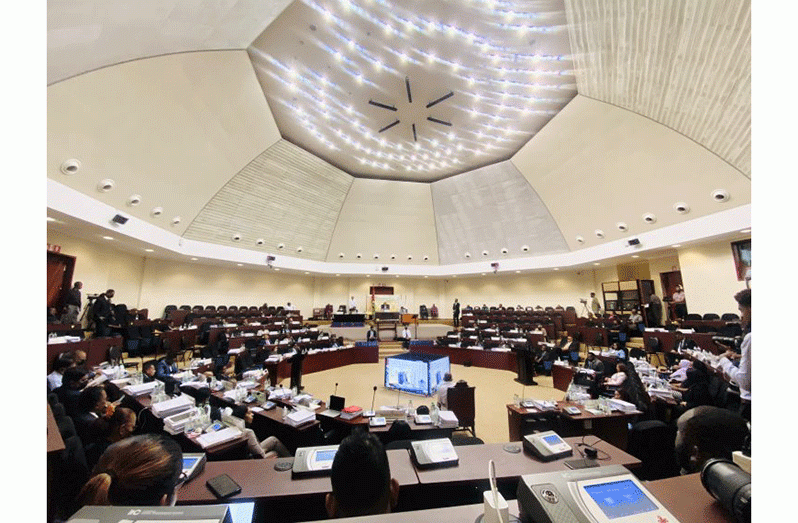THE National Assembly is set to convene an extraordinary session next Thursday to consider a Motion on the ongoing Guyana-Venezuela border controversy, which is currently before the International Court of Justice (ICJ).
This session takes place just one month prior to Venezuela’s planned referendum, which seeks to create a new State, including the portion of the Guyana’s territory that they have laid claim to.
While the specific agenda for the session remains undisclosed, it follows a recent meeting between a delegation of officials led by President Dr. Irfaan Ali and Opposition Leader Aubrey Norton. Their discussions were centred on Venezuela’s upcoming referendum.
According to a joint statement from the opposition and government, both parties have agreed that Guyana’s sovereignty is paramount, and is a matter on which the Guyanese people are all completely united.
As such, they have condemned Venezuela’s flagrant violation of the Rule of Law, and agreed that no effort should be spared to resist its persistent endeavours to undermine Guyana’s sovereignty and territorial integrity.
The officials further agreed that the preservation and protection of the country’s territorial integrity and sovereignty must be subserved by a vigorous and comprehensive public relations programme, and a proactive and robust diplomatic effort aimed at blunting Venezuelan propaganda and misinformation as they relate to the territorial controversy, generally, and the Geneva Agreement in particular.
In its most recent claims, the Spanish-speaking country has stated that it will be holding a “consultative referendum” on December 3 ahead of the ICJ’s ruling on the matter.
The Caribbean Community (CARICOM) recently noted the decision of the Venezuelan National Assembly to conduct a popular referendum on defending Venezuela’s claim of Essequibo.
CARICOM further said that two of the questions approved to be posed in the Referendum, if answered in the affirmative, would authorise the government of the Bolivarian Republic of Venezuela to embark on the annexation of territory which constitutes part of the Cooperative Republic of Guyana, and to create a State within Venezuela known as Guyana Essequibo.
In April of this year, the World Court ruled that the case Guyana brought before it seeking to affirm the validity of the 1899 Arbitral Award settling the boundaries between it and Venezuela was admissible.
This meant that the court could move forward with hearing the substantive case on its merits, of whether the1899 arbitral award settling the boundaries of the two countries is valid and binding.
The ruling marked the second time that the international court has rejected jurisdictional objections raised by Venezuela.
Guyana moved to the ICJ with its case in March 2018, challenging the non-participating Bolivarian Republic of Venezuela over its disagreement on the legal validity and binding effect of the 1899 Award.
Venezuela maintained that the ICJ was without jurisdiction to hear the case and refused to participate in the court proceedings.
The Spanish-speaking country had claimed that it is the “sole indisputable inheritor” of the Essequibo region and the Monetary Gold Principle.
Although Venezuela had claimed that the ICJ did not have jurisdiction to hear the substantive case, it made a U-turn following the court’s December 2020 ruling on that aspect of the case. Venezuela, on that occasion, contended that Guyana had no standing in the matter. The court unanimously rejected Venezuela’s objection.
Guyana is seeking a final and binding judgement that the 1899 Arbitral Award, which established the location of the land boundary between then British Guiana and Venezuela, remains valid, and that the Essequibo Region belongs to Guyana and not Venezuela.


.jpg)











